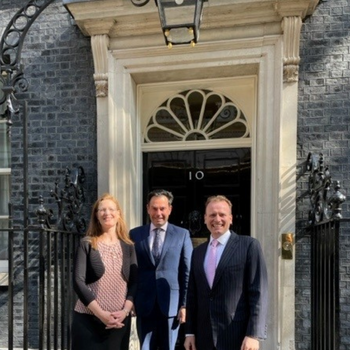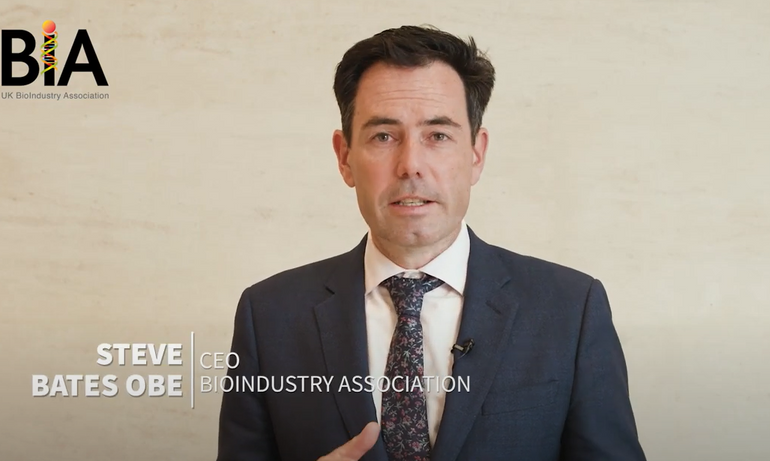CEO Update - 30 May 2023
BIA welcomes Chancellor’s life sciences growth package
Last Thursday was a big day for our sector as government and industry leaders came together for the UK Life Science Council meeting in Number 10 Downing Street.

Left to right: Nerida Scott, Head of Johnson & Johnson Innovation and BIA Board member, Steve Bates OBE, CEO of BIA and Dan Mahoney, Chair of BIA and UK Life Sciences Investment Envoy.
It’s the pinnacle of the partnership working – forged and deepened through our joint work in the pandemic – and the BIA was at the heart of the action-progressing key agendas on behalf of members.
A high presence of global pharma company CEOs was complemented on the industry side by Dan Mahony, Lisa Anson, CEO of Redx Pharma and myself for the BIA, as well as representation from the ABPI and ABHI.
On one level, the Council meets to ensure the delivery of the Life Science Vision (now two years old), but it also has a broader agenda to ensure our sector grows and thrives as one of the key pillars of the Government’s strategy for an innovation economy based on the UK being a science superpower. It’s a key moment when our industry and ministers come together to discuss the challenges and opportunities for UK life sciences, ensuring our industry continues to grow in the UK to deliver jobs and innovative new medicines for the NHS.
In recent months the Government has shown vital commitment to our sector, most crucially in listening and responding to our concerns when R&D tax relief was threatened, with the Chancellor announcing a welcome enhanced rate of relief for R&D-intensive SMEs at the Spring Budget, and in their swift and decisive action to prevent the failure of Silicon Valley Bank UK in March.
In my contribution to the Council meeting, I thanked Ministers for their collaborative approach and stressed the value of a close and productive relationship to deliver continued success.
The Chancellor, Jeremy Hunt MP, used the meeting to announce a wide-ranging package of investment and policy initiatives to support the continued growth of the sector. These included:
- Publication of the Independent Review of Clinical Trials and the government response. Lord O’Shaughnessy has conducted this review, which aims to tackle concerns about the UK’s ability to deliver commercial clinical trials. The aim is to create an environment where clinical trials operate faster, are better embedded in the NHS, and will encourage investment in the UK. As part of this, the Chancellor has committed £121 million, made up of new and existing funding, to speed up clinical trials and improve access to real-time data via new Clinical Trial Acceleration Networks.
- Publication of the Pro-Innovation Regulation of Technologies Review on Life Sciences and the government response. The Government Chief Scientific Adviser has led a specific review of regulation in the life sciences sector. The government response commits to support skills, collaboration and data sharing between industry and regulators, and to create accelerated regulatory pathways for innovative products.
- Driving investment through manufacturing, including a new biomanufacturing fund. This is key to supporting manufacturing investments in the UK and will particularly focus on delivering health resilience and ensuring we are better prepared for future health emergencies, supporting cutting-edge R&D and innovation. The government announced three new pots to bolster the country’s health resilience. A Biomanufacturing Fund worth up to £38 million in new funding has been announced to incentivise investment and improve the UK’s resilience to any future pandemics, via a competitive process to distribute grants. This comes on top of a further £6.5 million made up of new funding and funding from Innovate UK, to ensure that the Life Sciences sector continues to have the right people it needs to deliver its highly skilled work. £10 million new cash has also been announced to fund projects to drive innovation in cutting-edge medicine manufacturing that can bolster the UK’s health resilience, such as those which use nucleic acid technology and intracellular drug delivery to help improve vaccines, as part of Innovate UK’s ‘Transforming Medicines Manufacturing Programme’.
- Scaling up the UK’s world-leading scientific assets through a new investment in UK Biobank. Dedicated funding will upgrade existing capabilities for this world-leading biomedical research resource, including a new facility in the North West to store its 16mn samples and upgrade its IT infrastructure.
- Continuing to ensure the sector can access the finance it needs to grow. The British Business Bank calls for proposals under the Long-Term Investment for Technology and Science (LIFTS) initiative, providing up to £250 million to support successful proposals in mobilising institutional investment into the UK’s innovative science and technology companies. Full details of the call for proposals and the submission process are published on the British Business Bank website. The deadline for applications is Friday 28 July 2023.
- Ensuring the UK has the right skills to support the sector. This includes an apprenticeship manual, securing the legacy of Cell and Gene Therapy Catapults skills pilots and funding to strengthen the UK’s medicines manufacturing ecosystem to deliver the skills industry needs.
- Driving adoption through “Health Innovation Networks”. From October the Academic Health Science Network will be known as Health Innovation Networks with clear links into their local health infrastructure based in 15 locations with clear objectives and KPIs to get innovations and the most impactful technologies into the NHS both nationally and at the local level, matched to the specific needs of the NHS and local communities.
- Demonstrating the UK’s ambition and delivering outcomes for patients through Healthcare Missions. £42.7 million for the Mental Health Mission will go towards delivering treatments to patients, setting up a new centre in Liverpool to understand how mental, physical and social conditions interlink, and a site in Birmingham to support research and novel treatments for early intervention in psychosis, depression and children. Kate Bingham commented “Securing Husseini Manji as a co-chair of the Mental Health Mission is a real coup. He has a stunning record in developing new drugs for treatment-resistant depression at J&J. The Mental Health Mission’s focus to find better treatments for depression, bipolar disorders and schizophrenia in young adults and adolescents has never been more needed.”
- Taking steps to improve the supply of Life Sciences lab space through planning policy changes. Proposals include local authorities taking greater account of R&D needs in their planning decisions.
- Signalling the government’s vision to continue to drive growth in the golden triangle with a route update on East West Rail (EWR). This includes announcing its preferred route alignment for the third section of the railway between Bedford and Cambridge, including a direct link to the Cambridge Biomedical Campus.
The policy announcements are the result of multiple collaborative workstreams between industry and government over the past year or more, and a “Life Sciences Connect” event organised by the HM Treasury where roundtables discussed key details in March ahead of finalising the package details.
The package shows the benefit that can be derived through close partnership working with government for UK life science companies. This gives our sector positive momentum into the summer and provides much to work on. We will also continue pushing for progress in areas not addressed by the Chancellor last week, including restoring the SME R&D tax relief regime to full international competitiveness and ensuring VPAS recognises and rewards innovation.
I look forward to hearing your reflections on this in the coming weeks.

Steve Bates OBE
CEO, BioIndustry Association
More news and updates
A high presence of global pharma company CEOs was complemented on the industry side by Dan Mahony, Lisa Anson, CEO of Redx Pharma and myself for the BIA, as well as representation from the ABPI and ABHI.
On one level, the Council meets to ensure the delivery of the Life Science Vision (now two years old), but it also has a broader agenda to ensure our sector grows and thrives as one of the key pillars of the Government’s strategy for an innovation economy based on the UK being a science superpower. It’s a key moment when our industry and ministers come together to discuss the challenges and opportunities for UK life sciences, ensuring our industry continues to grow in the UK to deliver jobs and innovative new medicines for the NHS.

Left to right: Nerida Scott, Head of Johnson & Johnson Innovation and BIA Board member, Steve Bates OBE, CEO of BIA and Dan Mahoney, Chair of BIA and UK Life Sciences Investment Envoy.
.png)
.png)
